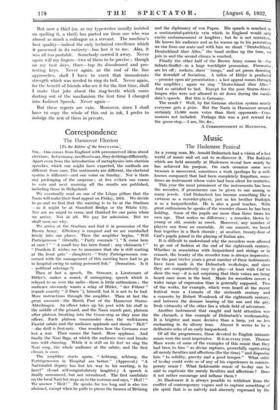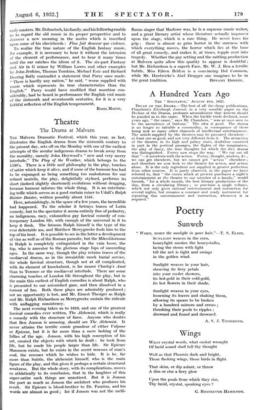Music
The Haslemere Festival
As a young man, Mr. Arnold Dolmetsch had a vision of a lost world of music and set out to re-discover it. The festivals which are held annually at Haslemere reveal how nearly he has achieved his purpose. On each occasion some new treasure is uncovered, sometimes a work (perhaps by a well- known composer) that had been completely forgotten, some- times an instrument whose voice had been silent for centuries.
This year the most prominent of the instruments has been the recorder, if prominence can be given to one among so many jewels. Carl Dolmetsch has become something like a virtuoso as a recorder-player, just as his brother Rudolph is as a harpsichordist. He is also a good teacher. With great enthusiasm he speaks of the recorder classes he has been holding. Some of the pupils are more than three times his own age. That makes no difference ; a recorder, blown by young or old, sounds as sweet. Moreover, any number of players can form an ensemble. At one concert, we heard four together in a Bach chorale ; at another, twenty-four of Carl's pupils joined in the playing of Italian airs.
It is difficult to understand why the recorders were allowed to go out of fashion at the end of the eighteenth century. Whether in association with harpsichord and strings or in consort, the beauty of the recorder tone is always impressive. For the past twelve years a great number of these instruments have been made in the Dolmetsch workshops, and since they are comparatively easy to play—at least with Carl to show the way—it is not surprising that their voices are being heard once more in the land. Music for recorders covers a wider range of expression than is generally supposed. Two of the works, for example, which were heard at the recent festival were a Coranto of the sixteenth century and a concerto by Robert Woodcock of the eighteenth century, and between the demure bearing of the one and the gay, fresh virtuosity of the other lies a whole field of adventure.
Another instrument that caught and held attention was the clarsach, a fine example of Dolmetsch's workmanship. It is brighter and more decisive than a harp, yet no less enchanting in its silvery tone. Almost it seems to be a deliberate echo of an early harpsichord.
Of all the programmes, those devoted to English intimate music were the most impressive. It is so every year. Thomas Mace wrote of some of the examples of this music that they had been to him "as divine raptures, powerfully captivating all unruly faculties and affections (for the time) "and disposing him "to solidity, gravity and a good temper." What critic of to-day could write so of any of his experiences in contem- porary music ? What fashionable music of to-day can be said to captivate the unruly faculties and affections ? Does it not rather encourage and inflame them ?
At Haslemere it is always possible to withdraw from the conflict of contemporary vogues and to capture something of the spirit that is so naively and sincerely expressed by the early masters. Mr. Dolmetsch, his family, and his following enable us to regard the old music in its proper perspective and to discover a new meaning in the motto which is inscribed upon some of his clavichords : Plus fail douceur que violence.
To realize the true nature of the English fantasy music, for example, it is necessary to hear it without the intrusion of the element of performance, and to hear it many times until the ear catches the idiom of it. The six-part Fantasy and Air in G minor by William Lawes and other examples by John Jenkins, Thomas Tomkins, Michael Este and Richard Deering flatly contradict a statement that Parry once made. "There is hardly any nation," he said, "worse supplied with music which represents its true characteristics than the English." Parry would have modified that assertion con- siderably, had he heard in performance the English viol music of the sixteenth and seventeenth centuries, for it is a very faithful reflection of the English temperament.
BASIL MAINE.



























 Previous page
Previous page